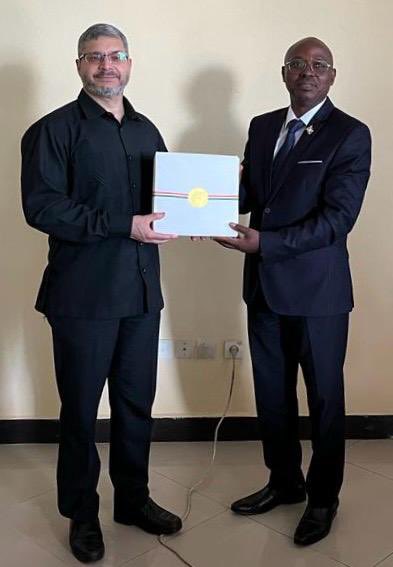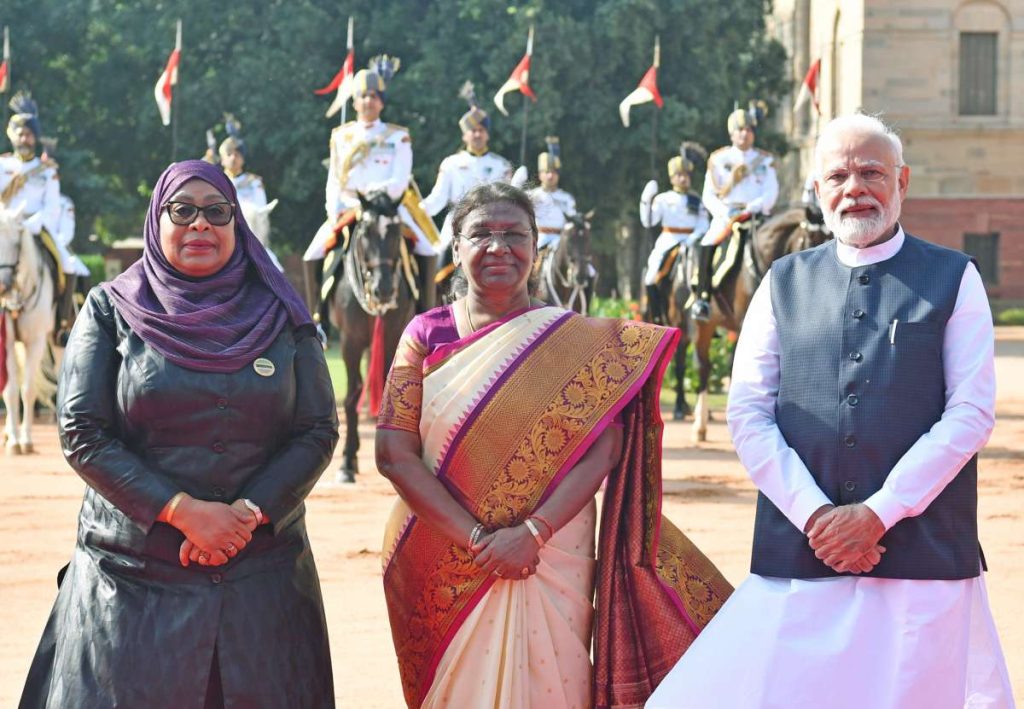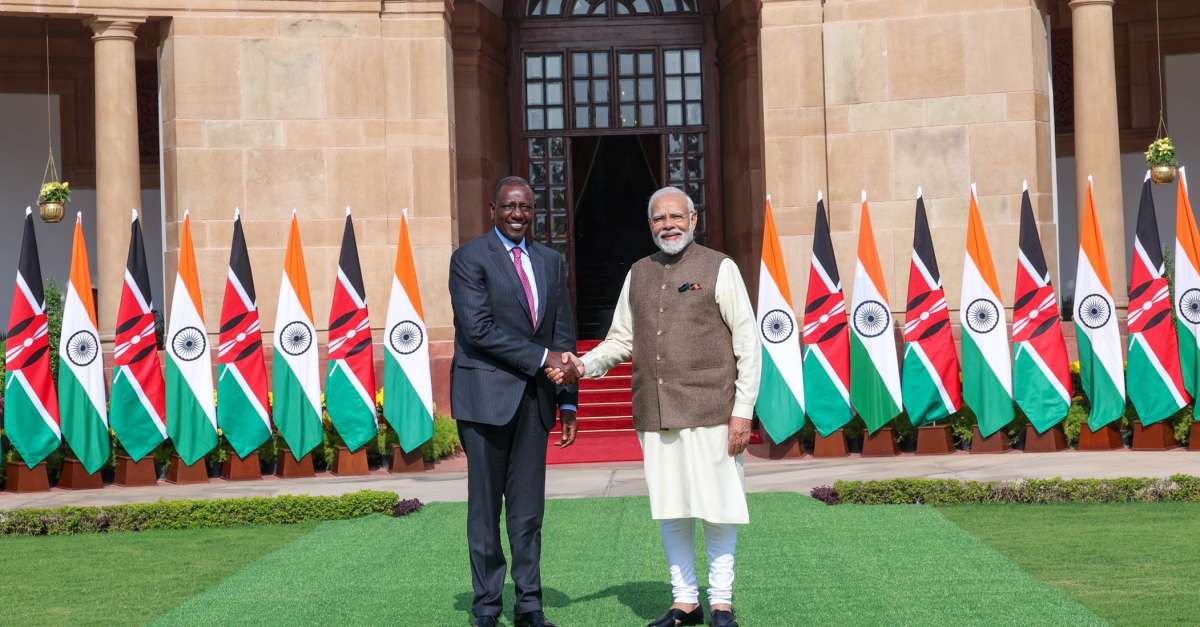India’s partnership with Africa, deeply rooted in history, is now being revitalised with renewed purpose….reports Asian Lite News
In a significant affirmation of the enduring partnership between India and African nations, the Foreign Office Consultations (FOC) between India and Burundi in Bujumbura on December 12 were marked by a profound review of their bilateral ties. Puneet R. Kundal, Additional Secretary (East and Southern Africa), and Ambassador Ernest Niyokindi, Director General of Bilateral Relations in the Ministry of Foreign Affairs of Burundi, led discussions covering trade, economic affairs, consular matters, and strategic collaborations in agriculture, education, health, digital technology, and renewable energy. This mutual commitment underscores a shared vision to fortify and broaden their relationship.
A momentous occasion unfolded at the Jawahar Lal Nehru University, New Delhi where the Honorary Doctorate was conferred upon President of the United Republic of Tanzania, Samia Suluhu Hassan. This recognition not only acknowledges her enduring connection with India but also emphasizes the educational dimension as a cornerstone of the bilateral relationship. Education and capacity building emerge as pivotal facets, with over 5000 Tanzanian nationals benefiting from India’s ITEC program. The establishment of the first overseas campus of the Indian Institute of Technology (IIT), Madras in Zanzibar, signifies a transformative leap in technical education for the African continent.
The intertwining of India’s G-20 Presidency and the Voice of Global South Summit highlights a commitment to championing the concerns of the developing world. The inclusion of the African Union as a full member in the G20 stands as a confirmation of India’s unwavering support for the rise of Africa, a sentiment reinforced by the historic visit of President Samia Suluhu Hassan on October 08-10. India’s embassies dotting the African landscape underscore a decade-long commitment to nurturing these ties. The traditional camaraderie between India and Tanzania, characterized by political understanding, economic engagement, and people-to-people contacts, remains a formidable pillar of cooperation. Despite global challenges, bilateral trade has surged to US$ 6.4 billion, affirming the resilience and dynamism of this relationship. India’s economic prowess, coupled with Tanzania’s impressive performance in Africa, opens avenues for collaboration and convergence. As the geopolitical centre of gravity shifts towards the Indo-Pacific region, guided by the Security and Growth for All in the Region (SAGAR) policy, India engages Tanzania as a strategic littoral neighbour. This cooperation holds the potential to contribute significantly to maintaining peace, prosperity, and security, particularly in the Indian Ocean.

The 3-day visit (4-6 December) of President William Samoei Ruto of the Republic of Kenya to India further accentuates the depth of bilateral relationships. Acknowledging the historical connections through the Indian Ocean, President Droupadi Murmu emphasized the robust nature of India-Kenya ties, encompassing trade, education, and technology. It is noteworthy that Kenya hosts a robust Indian-origin community of 80,000, seamlessly integrated into the social and economic structure of the nation. Proudly identifying as Kenyans, they simultaneously uphold the rich blend of Indian culture and values. This stands as an evidence to the inclusivity inherent in Kenyan society, highlighting the harmonious coexistence of diverse cultural identities. India’s commitment to Kenya’s developmental journey is underscored by significant investments and partnerships. The signing of five MoUs, spanning sports, digital solutions, cultural exchange, standards, and education, amplifies the commitment to broad-ranging cooperation. A joint vision statement on maritime cooperation, Kenya’s inclusion in the International Solar Alliance and the Global Bio-fuels Alliance, a substantial loan of US$ 250 million to Kenya for the modernisation of its agricultural sector, and collaborative efforts in space technology reemphasize the expansive scope of this partnership.
India’s partnership with Africa, deeply rooted in history, is now being revitalized with renewed purpose. The India-Africa Forum Summits held in 2008, 2011, and 2015 played a crucial role in strengthening the relationship, particularly the last summit, which expanded cooperation across all dimensions. This was followed by a series of high-level visits to African countries by India’s top leaders, including the president, vice president, and prime minister.
India has been actively engaging with African leaders, and vice versa. It is important to assess whether India’s diplomatic efforts in Africa have led to tangible economic benefits. India’s diplomatic approach to Africa must be in harmony with the continent’s own development goals. Africa has made significant progress in recent years, including improving peace and security, socio-economic development, democratization, and governance. The African Union’s Agenda 2063 and its Seven Aspirations provide a comprehensive framework for Africa’s development aspirations.
The African Development Bank’s 2013-2022 strategy outlined two key goals for Africa: achieving inclusive and environmentally friendly growth. To attain these goals, five priorities were identified for member-states: infrastructure development, regional economic integration, private sector promotion, governance and accountability emphasis, and skills and technology enhancement. While challenges persist, Africa is actively reforming institutions like the African Union and establishing new ones like the African Continental Free Trade Area. The continent’s resurgence is gaining global recognition, fuelled by its abundant natural resources, including minerals and hydrocarbons. Africa’s potential growth, representing 55 nations with 20% of the world’s population and 2.69% of global GDP, is a key factor driving this interest. Numerous countries, including the U.S., EU, China, Russia, Brazil, ASEAN, and the Gulf States, are actively vying to strengthen economic ties with Africa.
India’s trade with Africa has surpassed USD 100 billion and is remarkably balanced, stated India’s External Affairs Minister Dr. S Jaishankar at an event commemorating the African Union’s inclusion in the G20. He further highlighted India’s position as a top investor in Africa, with an estimated capital investment exceeding USD 80 billion. Dr. Jaishankar was addressing ambassadors from several African countries at the Yashobhoomi Convention Centre, New Delhi on November 10 to discuss India’s progress in digital infrastructure and its potential for collaboration. Emphasizing the importance of this initiative, recognized by the G20, he expressed optimism for future partnerships in the digital realm.
India has significantly expanded its diplomatic presence in Africa by opening numerous embassies and establishing the first Indian Institute of Technology and Forensic Sciences University abroad. India views its relationship with Africa as crucial for reshaping the global order, which has been unbalanced for the past two centuries. India played a pivotal role in securing permanent membership for the African Union in the G20, demonstrating its unwavering commitment to strengthening ties with Africa.
Despite the temporary setback caused by the pandemic, India remains committed to playing a long-term partnership role in Africa’s economic development. India’s firm interest in Africa’s economic growth presents numerous opportunities for both parties to enhance their existing bilateral ties and explore new avenues for collaboration, particularly in Africa’s untapped services sector.
India’s economic ties with Africa are diverse, encompassing grant-in-aid, concessional loans, capacity building, technical assistance, and project support. Africa has received a significant portion of India’s concessional loans, with over US$ 6.3 billion disbursed out of a total commitment of US$ 10 billion. India-Africa bilateral trade has grown steadily, reaching US$ 55.9 billion in 2020-21. India is Africa’s fifth-largest investor, with cumulative investments of US$ 54 billion. India aims to increase bilateral trade to US$ 150 billion and double investments to US$ 100 billion in the coming years. India’s Duty-Free Tariff Preference Scheme for Least Developed Countries (LDCs) has benefitted 38 African nations and expanded India-Africa trade. However, further geographical diversification of trade flows is eminently possible.
India’s manufacturing prowess could significantly boost the region’s manufacturing capabilities. Currently, Africa’s share in the global trade of intermediate manufactured goods is a mere 2%. African countries should capitalize on India’s expanding markets to maximize trade-driven economic growth. Investing in trade-related infrastructure and trade facilitation is therefore crucial for Africa’s economic progress.
The establishment of India-Africa Trade Council and 13 new offices in India will boost trade and investment opportunities for Indian businesses in Africa. India aims to open, or has already opened, new missions in 18 African countries, including Burkina Faso, Cameroon, Cape Verde, Rwanda, and Somalia. India’s cooperation with African countries will be tailored to their specific needs. India has opened IT centres, vocational training centres, and a Technology Centre in several African countries. India is collaborating with Japan and Kenya to build a cancer hospital in Africa and with the UAE to establish an IT Excellence Centre in Ethiopia. India’s e-VidyaBharati and e-ArogyaBharati Network Project aims to provide free tele-education and medical education to thousands of African students and professionals. India has earmarked a significant portion of its concessional credit to Africa under the International Solar Alliance (ISA). India and Africa can work together to address climate change, biodiversity loss, and promote a circular economy.
India-Africa trade soared to new heights in 2022-23, reaching a staggering $97.9 billion. India’s exports to Africa surged by 27.3% to $51.2 billion, while imports from Africa dipped by 5.4% to $46.7 billion. This shift was partly attributed to India’s increased sourcing of crude oil from alternative markets. Consequently, India’s trade balance with Africa swung into a surplus of $4.6 billion in 2022-23.
India’s trade with Africa is heavily reliant on fossil fuels, with petroleum products being a major export and crude oil a major import. However, climate change is forcing a shift in global trade patterns, with countries increasingly considering the carbon emissions associated with traded goods. One example of this is the European Union’s Carbon Border Adjustment Mechanism (CBAM), which aims to prevent “carbon leakage” and encourage developing countries like India and those in Africa to diversify their exports towards cleaner and more efficient technologies.

India and Africa are particularly susceptible to the effects of climate change, even though their average individual carbon dioxide emissions are significantly lower than the global average. In 2021, India’s per capita carbon dioxide emissions stood at 1.93 tonnes, while China’s and the United States’ were 8.05 tonnes and 14.86 tonnes, respectively. Africa’s per capita emissions were even lower, averaging just 1.04 tonnes. Only two African countries, Libya and South Africa, exceeded the global average of 4.69 tonnes per capita. Despite these low emission levels, the Notre Dame Global Adaptation Initiative Country Index ranks African countries as the top 10 most vulnerable to climate change globally. The notion that developing countries can initially pursue carbon-intensive growth strategies and later decarbonize is no longer viable. This coincides with the failure of developed nations to meet their $100 billion pledge in climate finance support for developing countries.
Against this context, one of the critical strategies for India and Africa will be to boost trade in environmental or green goods. Environmental goods, as defined by the International Monetary Fund, comprise products that contribute to environmental protection, such as pollution control and resource management systems. They also include goods that have been specifically designed to be more environmentally friendly or cleaner. Examples of environmental goods include industrial air filters, wastewater treatment products, and renewable energy technologies like solar panels and wind turbines.
In 2021, China held the top position as the world’s largest exporter of environmental goods, with a global share of 21.9 percent. Germany followed closely behind with 15.6 percent, and the United States held a share of 9.3 percent. India’s share, in comparison to these global leaders, remained relatively modest at 1.1 percent, mirroring its overall merchandise exports share of 1.8 percent.
In 2021, India exported environmental goods worth $1.7 billion to Africa, representing 10% of its global environmental goods exports. Nigeria was the largest African recipient, accounting for 1.8% of India’s global environmental goods exports, followed by South Africa at 1.2%. Together with Algeria, Kenya, and Egypt, these five countries accounted for over 56% of India’s environmental exports to Africa. Algeria had the highest intensity of environmental imports from India, with environmental goods accounting for 24% of its total imports from India. Burundi, Seychelles, and Ghana followed with import intensities of 12.6%, 11.5%, and 11.1%, respectively.
The main categories of environmental goods exported from India to Africa include acrylic polymers (5.7%), heat exchange units (5.4%), polypropylene sheets (4.5%), iron and steel structures for towers and lattice masts (4.2%), machines and mechanical appliances (4.1%), and board panels, consoles, desks, and other bases for electric control or distribution of electricity and electrical accumulators (3.8% each).
India’s average annual growth rate of environmental goods exports from 2012 to 2021 was 8.3%, outpacing Africa’s growth rate of 4.7%, indicating significant potential for further expansion. Notably, exports of photosensitive semiconductor devices, including solar cells, reached $20.9 million in 2021, accounting for 12.9% of Africa’s global imports of these products.
India has established itself as a trusted development partner for Africa, supporting sustainable development through concessional financing and private sector initiatives. Currently, 33 African countries are members of the International Solar Alliance, an Indian initiative. The dynamics of solar sector exchanges between India and Africa are driven by Africa’s abundant solar resources and India’s technological expertise. India can play a crucial role in establishing a collaborative platform for technology transfer and capacity building in this area. Beyond renewable energy, other potential areas of collaboration between India and Africa include climate-smart agriculture, water supply and wastewater management, strategic collaboration in critical minerals for electric vehicles, green hydrogen production, and mainstreaming the circular economy through recycling in various sectors. These collaborations can elevate India-Africa trade relations to a new level and establish them as a model for South-South cooperation in addressing climate change. As India and Africa forge ahead with shared visions and tangible collaborations, the trajectory of these relationships stands as a testament of the commitment to mutual growth, prosperity, and progress in the global context.
*Dr. Maheep is a leading analyst of India’s Foreign Affairs. He offers online courses to registered African students through E-Vidya Bharti, IGNOU, New Delhi.
ALSO READ: India Advises Legal Channels for Job Seekers

